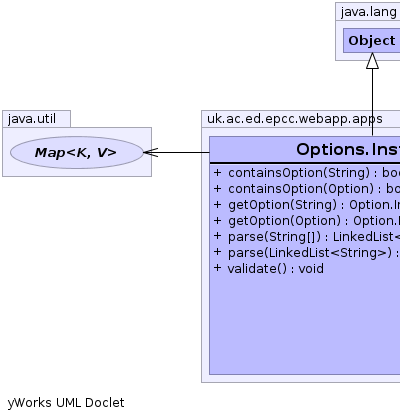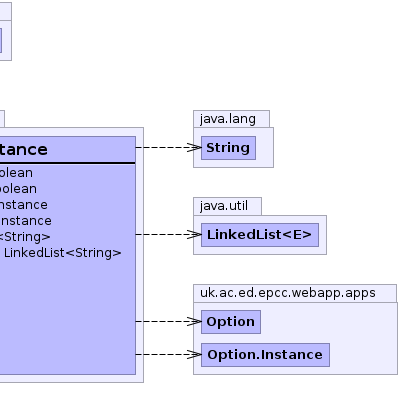- java.lang.Object
-
- uk.ac.ed.epcc.webapp.apps.Options.Instance
-
- Enclosing class:
- Options
public class Options.Instance extends java.lang.ObjectAn instance of anOptionsobject contains all options found in arguments on a command line. The choice of options is taken from the set of optionsOptionspresents. All constraints applied byOptionsand theOptions it contains are used when extracting options from command line arguments
-
-
Method Summary
All Methods Instance Methods Concrete Methods Modifier and Type Method and Description booleancontainsOption(Option opt)Tests to see if the specified option has an instance in this objectbooleancontainsOption(java.lang.String name)Tests to see if the specified option has an instance in this object.Option.InstancegetOption(Option opt)Returns the instance of the specified option that is stored in thisOptionsinstance, ornullif there is no instance of the specified option here.Option.InstancegetOption(java.lang.String name)Returns the instance of the specified option that is stored in thisOptionsinstance, ornullif there is no instance of the specified option here.java.util.LinkedList<java.lang.String>parse(java.util.LinkedList<java.lang.String> argQueue)java.util.LinkedList<java.lang.String>parse(java.lang.String[] arguments)Parses a set of arguments, extracts options from them and stores them in this instance.voidvalidate()Makes sure all required options have instances in thisOptionsinstance.
-
-
-
Method Detail
-
containsOption
public boolean containsOption(Option opt)
Tests to see if the specified option has an instance in this object- Parameters:
opt- The option to check for- Returns:
trueif there is an instance of the specified option in this object.falseotherwise.
-
containsOption
public boolean containsOption(java.lang.String name)
Tests to see if the specified option has an instance in this object. The option may be specified by long name or short name- Parameters:
name- The long or short name of the option to look for- Returns:
trueif there is an instance of the specified option in this object.falseotherwise.
-
getOption
public Option.Instance getOption(Option opt)
Returns the instance of the specified option that is stored in thisOptionsinstance, ornullif there is no instance of the specified option here.- Parameters:
opt- The option to check for- Returns:
- The instance of
opt, ornullifoptdoesn't have an instance stored here.
-
getOption
public Option.Instance getOption(java.lang.String name)
Returns the instance of the specified option that is stored in thisOptionsinstance, ornullif there is no instance of the specified option here. The option may be specified by long name or short name- Parameters:
name- The long or short name of the option to look for- Returns:
- The instance of
opt, ornullifoptdoesn't have an instance stored here.
-
parse
public java.util.LinkedList<java.lang.String> parse(java.lang.String[] arguments) throws java.lang.IllegalArgumentExceptionParses a set of arguments, extracts options from them and stores them in this instance. All arguments that are not options are returned in the order they were discovered. Options are identified by the following properties:
- An argument beginning with -- (double hyphen) is processed as an option specified by it's long name.
- An argument beginning with - (hyphen) is processed as an option or several options specified by it's/their short name.
- The arguments - and -- are not treated as options. They are treated as non-option arguments.
Once an option is identified, it is processed in the following way:
- If the argument holds an option's long name:
- If it a value separator, it's long name is taken to be the argument string up to but not including the value separator. It's value is the argument string from the first character after the value separator to the end of the argument
- If the argument doesn't contain a value separator, the entire argument is taken to be the option's long name
- If the argument holds and option's short name:
- If it contains contains a value separator, it's short name is taken to be first non hyphen character in the argument.
- If the second character is a value separator, the value of the option is the rest of the argument after the value separator.
- If the value separator occurs later in the argument, the value of the option is taken to be the argument string from immediately after the second character to the end of the argument. Using this mechanism, property key-value pairs can be set.
- If there is no value separator, each character of the argument after the first hyphen is taken as the short name of an option
- If the option takes an argument and the argument but no value separator was present, the next argument is taken to be the value.
Example 1: Below are options, a, b and c. a and c take arguments. b does not.
-abc arg1 arg2 arg3 arg4
This produces the following result:a = arg1
b (no value)
c = art2 remaining arguments = arg3 and arg4Example 2: Below are options, P, assign-arg and flag. All take arguments except flag.
-Pprop=value --assign-arg=val arg1 --flag arg 2
This produces the following result:P = prop=value
assign-arg = val
flag (no value)
remaining arguments = arg1 and arg2- Parameters:
arguments- The arguments to parse and extract options and values from- Returns:
- A list of all arguments that are not options or values, in the same order they appeared in the specified arguments
- Throws:
java.lang.IllegalArgumentException
-
parse
public java.util.LinkedList<java.lang.String> parse(java.util.LinkedList<java.lang.String> argQueue)
-
validate
public void validate() throws java.lang.IllegalStateExceptionMakes sure all required options have instances in thisOptionsinstance.- Throws:
java.lang.IllegalStateException- If a required option does not have an instance in thisOptionsinstance.
-
-

